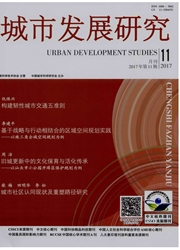

 中文摘要:
中文摘要:
论文分析了经济转型背景下市场化改革和政府制度转型如何影响中国城市的空间扩张过程,并基于1998年、2002年、2004年和2006年中国地级市建成区数据对Muth.Mill模型进行实证检验。结果表明经济增长、人口城市化、交通改善、服务业发展是中国城市空间规模扩张的主要原因;分年度的回归表明,近年工业化对城市空间规模的影响不显著;受国家对土地空间规制的影响,城市对农村的相对效用未能影响城市的空间变化。
 英文摘要:
英文摘要:
The paper analyzed how the market reform and government institution transition influence spatial expansion of Chinese urban land. Then a empirical test was given based on Muth-Mill model using Chinese prefecture level cities data in 1998, 2002, 2004, 2006. The results indicate that economic growth, urbanization, transport progress and the service development are the main courses of Chinese urban space expansion. Results of regression by year indicate that industrialization does not significantly influence urban space expansion. The relative utilization of urban to rural can't influence the cities space because of government's strict regulation on land.
 关于贺灿飞:
关于贺灿飞:
 同期刊论文项目
同期刊论文项目
 同项目期刊论文
同项目期刊论文
 Spatial organization of multinational corporations in China: An Empirical Study based on Fortune Glo
Spatial organization of multinational corporations in China: An Empirical Study based on Fortune Glo Geographical concentration of manufacturing industries in China: The importance of spatial and indus
Geographical concentration of manufacturing industries in China: The importance of spatial and indus Globalization, institutional change, and industrial location: Economic transition and industrial con
Globalization, institutional change, and industrial location: Economic transition and industrial con 期刊信息
期刊信息
